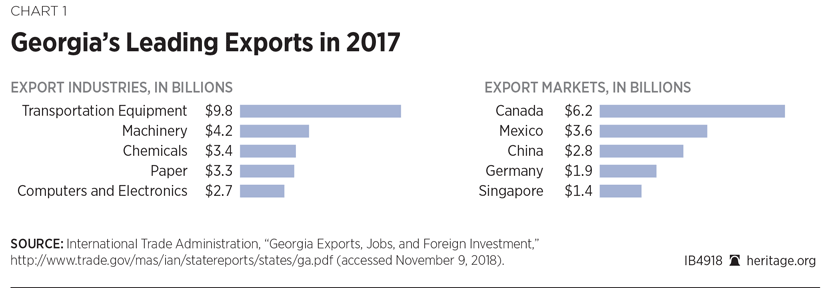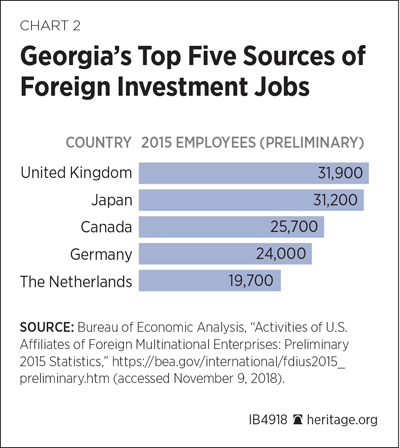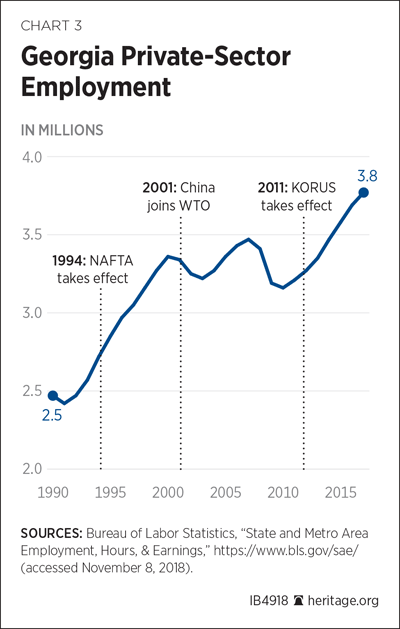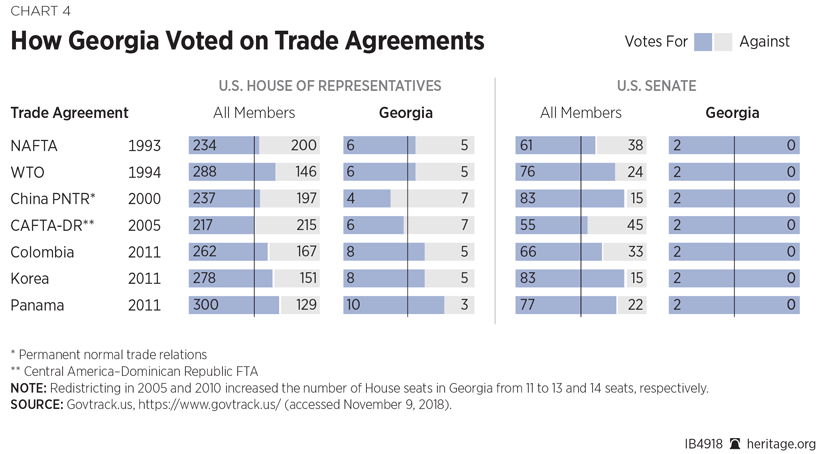International trade and investment support more than a half-million jobs in Georgia, and the state is the 12th-largest exporter in the United States. Unlike many other states, nearly half of Georgian jobs supported by trade are due to foreign direct investment (FDI). The key export industries in Georgia are aerospace and spacecraft, as well as transportation services. The providers of these exports rely on access to intermediate goods from around the world to remain competitive, and more than 60 percent of Georgia’s imports from Canada and Mexico in 2016 were intermediate goods.
Georgia’s congressional delegation has increased its often-bipartisan support for free trade in recent years. In 1993, five of the six votes cast in favor of the North American Free Trade Agreement (NAFTA) were from Democrats. Georgia’s Senators both voted in favor of NAFTA, and that unanimous support for trade agreements has remained firm over the years. The most recent votes cast by House Members from Georgia, however, fell mostly along party lines, except for the U.S.–Panama FTA, which received support from all but three Members.
The congressional delegation from Georgia will likely have the opportunity to vote on the renegotiated NAFTA and advise the Trump Administration as it negotiates several new trade agreements. When doing so, these Members should keep in mind that the purpose of a trade agreement is to ease and facilitate the freedom of Americans to buy and sell around the world, not to erect new barriers to manage trade flows. Ultimately, the easiest way to achieve this goal is by unilaterally lowering tariffs, not by imposing new barriers, as the Trump Administration has done throughout 2018.
Georgia Ranked 12th for Exports
In 2017, Georgia’s goods exports were valued at roughly $37.2 billion. Over 85 percent of the 14,000 companies that export from Georgia were small and medium-sized businesses. In 2016, Georgia’s goods exports supported nearly 182,000 jobs, 93 percent of which were in manufacturing.REF In the services sector, Georgia’s exports grew by 95 percent between 2006 and 2016, from $11 billion to $21 billion, supporting over 130,000 jobs.REF This services trade growth is a representation of the broader direction of trade in the U.S. While goods trade continues to grow, services are becoming vital to the economy.
As shown in Chart 1, Georgia’s top export industry is transportation equipment, valued at $9.8 billion. This industry accounts for 26 percent of Georgia’s entire goods export market. The remaining largest categories include machinery ($4.2 billion), chemicals ($3.4 billion), paper ($3.3 billion), and computer and electronic products ($2.7 billion).REF

Georgia’s largest export markets are Canada and Mexico, with Georgian exports totaling $6.2 billion and $3.6 billion, respectively. These two nations, comprising over a quarter of all of Georgia’s goods exports, are some of the United States’ leading trade partners and parties to NAFTA. Besides Canada and Mexico, Georgia’s top five export markets include China ($2.8 billion), Germany ($1.8 billion), and Singapore ($1.4 billion). In 2017, around 41 percent of Georgia exports went to countries with which the U.S. has an FTA.REF
Aerospace and Transportation Services Exports Lead in Georgia
Georgia’s annual export values make it the 12th-largest exporting state; and when those numbers are combined with imports (or total trade), Georgia is the eighth-largest trade state in the U.S.REF The primary subsector of transportation equipment exports from Georgia is aerospace and spacecraft. In 2017, exports from this subsector were valued at $6.8 billion.REF According to the Georgia Department of Economic Development, the state also “[leads] the nation in the export of chemical woodpulp, Kraft paper and paperboard, poultry, kaolin and carpets.”REF Another primary export sector is transportation services, valued at $5.6 billion in 2016.REF
Georgia Is a Top Importing State
For Georgia’s 14,000 exporting companies, foreign-owned businesses, and consumers, competitively priced goods, sourced domestically or internationally, are crucial for economic prosperity. In 2017, Georgia imported more than $91 billion in goods, making it the seventh-largest import state in the U.S.REF In 2017, Georgia’s top three import markets were China, Germany, and Mexico, and more than 60 percent of Georgia’s imports from Canada and Mexico in 2016 were intermediate goods.REF
Trump’s Tariffs Are Hurting Georgia
Since January 2018, President Donald Trump has imposed tariffs on more than $350 billion of imports from around the world, representing roughly 12 percent of U.S. imports.REF More than $250 billion of those imports are from China, and the President has stated his willingness to impose tariffs on all remaining imports from China (valued at roughly $260 billion).REF There are also threats looming of tariffs on automobiles and automobile parts, a more than $700 billion industry.REF
The various tariffs are already impacting Georgian businesses, including local pecan farmer R. G. Lamar. Lamar usually sells more than half of his pecans to customers in China, but during the ongoing trade war, China increased its tariffs on pecans from 7 percent to 47 percent.REF This move results in the price of Lamar’s pecans increasing in China, making them less attractive to Chinese customers. Another company, Regal Marine Industries, “employs 750 people at its headquarters in Orlando, Florida, and in Valdosta, Georgia, from factory technicians to engineers to office staff.”REF The increased price of domestic and imported steel and aluminum as a result of the tariffs has caused Regal Marine Industries to consider laying off some of its employees in Georgia.
A recent report by Trade Partnership estimates that if President Trump ends up imposing tariffs of 25 percent on automobiles and automobile parts following an investigation by the Department of Commerce, the result would be a net loss of 157,000 jobs in the U.S.REF The report also estimates that tariffs would “increase prices of both imported vehicles and U.S.-made vehicles with foreign components.”REF The effects of this threat are already causing uncertainty for Kia Motors, a South Korean car company looking to open a plant in West Point, Georgia.REF In a letter to the Commerce Department, Kia stated that the potential tariffs
almost certainly would result in a significant reduction in the number of U.S. workers employed in well-paying manufacturing jobs at Kia’s Georgia factory, as well as in the hundreds of Kia dealerships around the country whose service centers rely on imported auto parts. Further, it would also impact Kia’s U.S. suppliers, resulting in additional losses of well-paying manufacturing jobs in and around Georgia.REF
The new tariffs vary in rate, but the overall effect has been consistent: increased prices for both imported and domestic products covered by the tariffs. It is time for them to go before the negative impacts on Georgia, and the rest of the country, get worse.
Foreign Direct Investment Creates Jobs
In addition to exports, FDI significantly benefits the economy and helps to create jobs. Roughly 227,000 Georgians were employed by foreign-owned companies in 2015, accounting for 6 percent of all private-sector employment, and 35 percent of manufacturing employment.REF As shown in Chart 2, Georgia’s top five sources of FDI employment represent half of all FDI jobs in the state: the United Kingdom (31,900 jobs), Japan (31,200 jobs), Canada (25,700 jobs), Germany (24,000 jobs), and the Netherlands (19,700 jobs).REF

There are countless examples of foreign investment creating jobs for Georgians in a variety of industries, including manufacturing and IT services. In 2017, Kamstrup, a Danish manufacturer of energy and water meters, established its North American headquarters in Roswell, Georgia.REF The investment by Kamstrup created 52 new jobs and will help the company to grow its operations in the U.S.REF Lars Bo Kristensen, chief executive officer of Kamstrup, explained that the company “[sees] an increasing need and interest for intelligent and accurate water metering solutions for the water utilities” in the U.S., and that “the individual consumer has an increased focus on the usage.”REF
Last year, Tech Mahindra, a leading Indian technology firm that already employed roughly 500 people in its Atlanta headquarters, announced that it had hired an additional 100 employees.REF An official from the company stated that “getting access to the right kind of talents is key to the success of this strategy and we are so thrilled that we could source so much qualified local talent from the Atlanta area.”REF Tech Mahindra also has operations in 18 other states and more than two dozen cities, employing “over 2,000 U.S. citizens [and] actively recruiting from leading universities across North America.”REF
Trade and Jobs
Critics of free trade, especially trade with China, often claim that America has lost thousands of jobs because of its openness. The Economic Policy Institute claimed in a report that 93,700 jobs in the state of Georgia were “lost or displaced by the goods trade deficit with China between 2001 and 2013.”REF A fundamental aspect of trade, and any other driver of competition and innovation in an economy, is creative destruction. This means that, yes, trade can result in elimination of some jobs in less-efficient sectors—while new jobs are created in more-efficient sectors. Technological advancements typically have similar effects.

It is crucial, however, to make clear that there has been no net job loss in Georgia, or in the U.S. more broadly, due to trade with China or any other country. In fact, Chart 3 shows that private-sector employment in Georgia increased by nearly 1.3 million jobs between 1990 and 2017, despite the U.S. entering NAFTA in 1994 and China joining the World Trade Organization in 2001.REF Any claims otherwise fail to look at full datasets and choose to focus on a period of time where the United States was experiencing an economic situation that was the consequence of many factors, not simply trade.
Support for FTAs
Chart 4 shows that Georgia’s congressional delegation has increased its support for free trade in recent years. In 1993, support for NAFTA was split almost in half, and five of the six votes cast in favor of the agreement were from Democrats. Georgia’s Senators both voted in favor of NAFTA and that unanimous, and often bipartisan, support for trade agreements has remained firm over the years. The most recent votes cast by House Members from Georgia, however, fell mostly along party lines, except for the U.S.–Panama FTA, which received support from all but three Members.

The new Congress will likely have the opportunity to decide the fate of several new trade agreements, including the renegotiated NAFTA, called the U.S.–Mexico–Canada Agreement. The Trump Administration also notified Congress of its intent to negotiate trade agreements with Japan, the European Union, and the United Kingdom earlier this year. These negotiations will take time, but Georgia’s delegation is positioned to play a vital role in the process, given that Senator Johnny Isakson (R–GA) sits on the Senate Finance Committee, which has jurisdiction over trade matters.
Conclusion
The near future for Georgia seems bright, as the make-up of the congressional delegation will be very similar to that of 2011. The benefits of trade for Georgia are undeniable, and the growing support for trade agreements over time by the delegation indicates that Members recognize these benefits.
Members should keep in mind that the purpose of a trade agreement is to ease and facilitate the freedom of Americans to buy and sell around the world, not to erect new barriers to manage trade flows. It is crucial that Georgia’s congressional delegation advises the Trump Administration based on this purpose as it negotiates new trade agreements, as well as urges President Trump to eliminate the harmful tariffs that have been imposed throughout 2018.
—Tori K. Whiting is Jay Van Andel Trade Economist in the Thomas A. Roe Institute for Economic Policy Studies, of the Institute for Economic Freedom, at The Heritage Foundation. William Tomlinson, a member of The Heritage Foundation’s Young Leaders Program, made valuable contributions to this Issue Brief.


